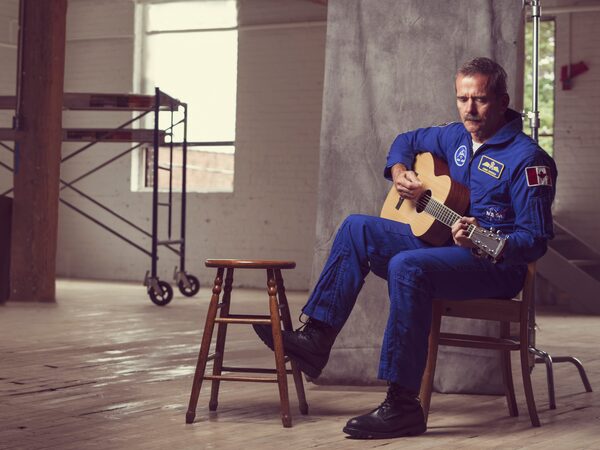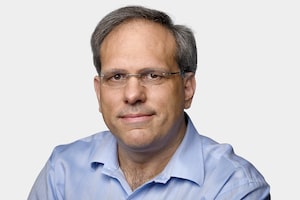
Astronaut Chris Hadfield.Max Rosenstein/Handout
In 2013, Chris Hadfield reignited public interest in spaceflight by playing his guitar in orbit and sharing his photos and insights over social media during his stint as commander of the International Space Station. Since then, the former Canadian astronaut has become a media fixture, as a public speaker, television host, MasterClass teacher, musician and mystery writer, among other roles.
This week, fresh from recording a cameo appearance with Murdoch Mysteries and performing with the Vancouver Symphony Orchestra, Hadfield is co-chairing Toronto’s Elevate Festival, a sprawling arts, culture and technology mashup. Between engagements, he sat down with The Globe and Mail to talk about how to relax when life is about doing everything, everywhere, all at once.
The last time you spoke to The Globe, you were lying on an examination table and researchers were studying how your body was recovering after six months in orbit. What does real down time look like to Chris Hadfield?
This is me on vacation. I have no desire to do nothing. I really feel best when I’m learning things, building things, teaching and sort of just increasing my personal capacity. It’s wonderful waking up in the morning after a good sleep – which is my number one requirement. Then I try to exercise as many mornings as I can. And then I’ve just got this list of things I’m going to try to do. It’s a fascinating mix of challenges and a whole plateful of stuff that keeps me busy every day. I think if we wiped all of that out I would just as rapidly fill my plate back up, no matter what field I was in.
Counter doubts by improving yourself, even a little, every day, says astronaut Chris Hadfield
Chris Hadfield: ‘When they walked on the moon, I decided then to turn myself into an astronaut'
How do you stay on track?
I think it’s a nature-nurture thing. I’m an engineer. I used to be a downhill ski racer. I was a combat fighter pilot during the Cold War; I was a test pilot. Things that are very demanding and unpredictable with an extremely high risk level teach you to prepare methodically. If you start building the capacity to do that on regular basis I think it seeps into how you do everything.
When you were an astronaut your time was focused on one goal: your mission in space. How has that changed now that you’re involved in so many different projects?
To me it’s exactly the same. When I was in the astronaut office we had schedulers to make sure we were ready for whatever moments were coming. I still have someone doing my schedule because I have lots of folks asking me to do things and I want to try and be as productive as I can. It’s just a matter of how to prioritize the things that I think are really worth doing.
How do you recharge?
I’ll take the dog for a walk. I find walking or running is a really good time to think. Writing fiction is a whole new thing for me and requires not just time and place, but a certain emptiness of head in order to be creative. When I was writing The Apollo Murders, a lot of my plot ideas came while I was exercising because there was suddenly no other distraction. I like playing music as well, and so I always keep the guitar handy.
How can we make a better life on Earth? Astronaut Chris Hadfield has some ideas
What are you listening to these days?
For me, music is very engrossing and I am normally very deliberate about listening. I’m in a band and we did a concert down in Galveston [,Tex.] a month ago, which was so much fun. Getting ready for that concert we had to go through hundreds of songs that we know as a band to whittle it down and find some new stuff to bring in so that dictated my listening for a while. Jason Isbell has written some beautiful stuff and I learned a couple of his tunes. Joe Corcoran has a new album out that I’ve been listening to.
What about sci-fi? As a writer and an astronaut, are you a big fan of the genre?
Earlier in my life I was a huge science-fiction fan. Now I don’t read so much sci-fi except when it’s more of a thought experiment, like Klara and the Sun, which I read during the pandemic. The Apollo Murders is not really science fiction but an alternative history thriller, a lot of which happens to be set in space.
There been a big shift toward private spaceflight in recent years, led in part by some companies that you’ve worked with, including SpaceX and Virgin Galactic. Would you go back to space as a private citizen?
I’d never say never, but I very much doubt it. If I had never flown in space, my answer would be different. But I’ve been very lucky. So when the first Canadian goes to the moon I’ll be on the sidelines, cheering, louder and more enthusiastically than anyone – and with not a hint of jealousy.
This interview has been edited and condensed.
 Ivan Semeniuk
Ivan Semeniuk